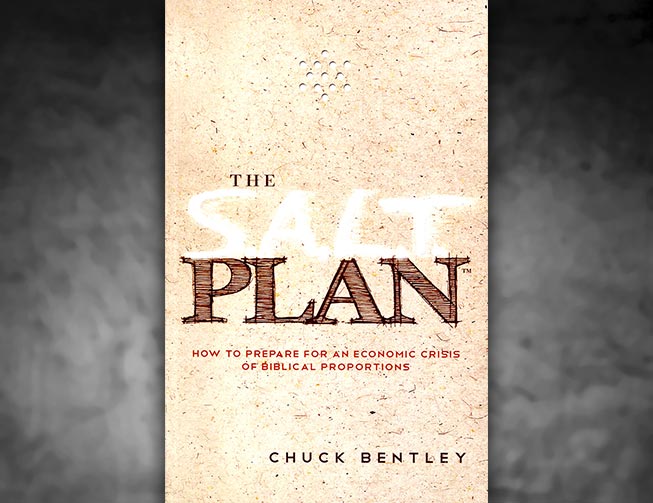The S.A.L.T. Plan is a culmination of principles compiled into a practical guide that provides both biblical wisdom and sound advice to help you carefully plan for hard times, while continuing to be faithful with your God-given resources.
The Enemy will never waste a good crisis, so neither should we as God’s people. We can turn everyday adversity into advantage by loving others and leading them into God’s Kingdom during their time of need. The signs are around us every day. We are truly in times of economic hardship, and some would even say that we are hinging on an economic event of biblical proportions. The idea of preparing for hardship is a timeless concept. How can you protect your family in the midst of financial crisis? God’s Word provides proven principles for preparing you to do well in any economic situation.
Are you ready to commit to being salt and light in a darkening world?
- Quote: “God’s word consistently tells us that debt is something to be avoided whenever and wherever possible.” (18)
- Quote: “Our true Hope should not be in a recovery, but in a revival. A revival is a sincere turning back to God’s ways and wholeheartedly embracing our personal need for him.” (22)
- Note: The strongest nations are losing themselves to debt and so are many of their people. If we avoid debt and look for a solid foundation, a revival can happen on top of that — we are past an easy and simple recovery.
- Quote: “Unfortunately like all of the powerful elite, both [Greenspan and Summers] miss the point that the mountain of Debt that has been heaped up since 1971 is fast reaching the point of collapsing like a too-big tailings pile and taking the monetary system down with it.” (25-26)
- Quote: “The good news is that Christians can do well in any economic circumstance. To do well means to be a good and faithful steward of the resources God entrusts to you; to be prudent and watchful. That is our part; He is responsible for the results.” (28)
- Notes: There are four identified possibilities for the future, from total collapse of our government to a worldwide unification of countries. We don’t know what is going to happen, but as Christians we have the Bible to show us how to act in the mean time.
- Quote:“God uses times of trouble to help us draw near to Him that we might call out for His help.” (33)
- Quote: “Rather than looking to government in a time of crisis, it is far better to rely on the merciful God who gave you skills and resources to provide for yourself.” (38)
- Notes: God may use economic crises to bring us back to him or test our faith — we need to be prepared so that we will be ready to answer God and to help others.
- Quote: “In humans, jealousy is usually a character flaw, but for God, the only One who is worthy of worship, jealousy is a thoroughly righteous response when his people begin to worship anything but Him.” (42)
- Quote: “The lesson from this famine is to serve God, not the gods of the culture.” (49)
- Notes: We need to understand that God is jealous — He is jealous for our love. He created us so He should get our worship. He is so willing and able to help us whenever we ask, but so often we turn to other alternatives.
- Quote: “It’s never a good idea to doubt the power of the Lord to intervene in economic matters.” (56)
- Quote: “God is perfectly capable of controlling an economy … and that should bring us to the end of any attitude of self-reliance. We are to be God-reliant in good times and bad.” (58)
- Notes: God can do anything. He can see and predict the future, He can cause huge armies to flee at the sound of footsteps, He can bring about His justice here on earth. Why would we try to trust in ourselves, when it is so much more profitable to trust in God?
- Quote: “The government is incapable of legislating away greed. Greed is a condition of the human heart and is only eradicated by a change of beliefs and a shift in values.” (61)
- Quote: “Barnabas and Saul … were His hands and feet ready to meet the needs of others when the world least expected it. They knew they were called to be salt, the preservative of the beautiful and matchless Gospel of Jesus Christ, and today, we have the same opportunity.” (65)
- Notes: The early church was not supported by small tithes; it was supported by the sale of assets and the whole gift of the profits. We have to be prepared to put a greater value in the Kingdom than on material possessions (62). No matter what was thrown at the early church, whether it be persecution or famine, they stood up to it … together.
- Quote: “Greed and fear are powerful forces in the human mind. Only through a transformation of the heart are we free from them.” (68)
- Quote: “Work hard and be productive, live within your means, save and be generous with others. Understand that God owns everything, and you are merely His steward. Do these things and He will pour His blessings upon you.” (71)
- Notes: It takes a lot to share with others when you yourself are suffering. However, God is in control and we can trust Him no matter what; therefore we can be generous. There is no point in trusting in anything else — everything else will fail us.
- Quote : “S – Save A – Asset Allocation L – Liquidity T – Truth”
- Quote: [Talking about economics being a storm] “The SALT Plan then, is not about last-minute sandbags. Its about building a levee around your household that’s firmly in place before the trouble starts so that you are prepared not only to weather the storm yourself, but you’re also free to help those in need around you.”
- Notes: This chapter gave a simple over view of the SALT plan as a whole and also included a lot of great metaphors to understand the importance of having a plan. Life is so unpredictable; in the midst of life’s storms, those that are prepared will be able to survive as well as help those around. That is what we are called to as the church.
- Quote: “In the SALT Plan you will do the saving. You will not wait for the government to save for you. It is always God’s will that you rely on him to provide through the resources He gives you — not the government.”
- Quote: “I cannot emphasize strongly enough the absolute importance of remaining generous to God’s kingdom while implementing the SALT Plan. The 10% directed toward giving, by the way, is only the minimum. I encourage you to give as much as you can during the process and be prepared to give even more during a crisis.”
- Notes: In Chapter 9 the author discusses the importance of saving. Not only is this financially responsible, but it will also allow you to be the church in times of struggle and to give to those around you. We see in the Bible that Joseph used his power in the government to save for the people of Egypt. We are not to rely on our government but instead save individually so that we may give.
- Quote: “A family business is also a great way to provide multiple incomes. Consider starting a small business on the side to involve your spouse and children. You can work your regular job by day, and become an entrepreneur by night. For the best Christian advice on setting up a home-based business, you can’t do better than Wade Myers. Explore all of his resources at Crown.org.”
- Quote: [Talking about being prepared for a literal natural disaster] “Your goal is to have a months worth of provisions for your household. Once you’ve achieved that, continue to build on these resources so that you have a surplus to share with others. That, after all, is what the SALT Plan is all about.”
- Notes: This chapter is about handling the assets you are blessed with in an appropriate and biblical manner. God told parables of servants who invested their talents and multiplied them, and they were the ones that were blessed, not the one who buried it and returned the one single talent. We are to grow what we have so that we may give.
- Quote: “We’re taught to make investments for the long term, but we never think about what we would do in the short term if we had to become liquid. In the SALT Plan liquidity not only means that you can convert fixed assets into transferable assets; it means that everything can be mobile.”
- Quote: “In biblical terms, however, we often see that liquidity is simply being available, unhindered, and mobile to answer God’s calling. Imagine leaving everything you feel is safe and comfortable, as the Lord commanded Abram.”
- Notes: This chapter on liquidity is about the importance of being flexible with your finances, both liquid and “solid.” Having liquidity in our lives gives us the ability to follow God’s call in an instant and does not trap us with assets we cannot use.
- Quote: “The final element, however, truth, has value not only in this life, but in the life to come. If we omit the truth from our plan, we miss our opportunity, to become the salt that God wants us to be for his glory.”
- Quote: “A crisis brings about the end of false security. It should not be a time of fear but of faith. When traditional support structures, recognize that nothing can separate you from the love of God — not famine, nor persecution, or even death.”
- Notes: This chapter emphasizes seven biblical truths regarding moving forward in preparation for an economic event of biblical proportions that prepare us for circumstances in this life. This is the final chapter of the book and it ends with the concept of truth. We are called to be honest in all of our dealings.

